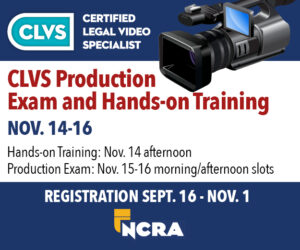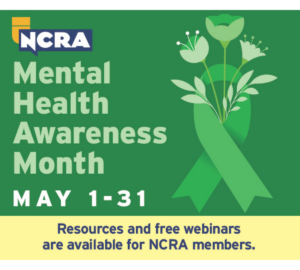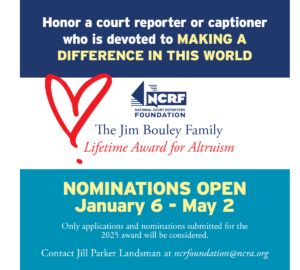To mark the 2019 Celebrate Certification Month, all through May we will take a look in each week’s JCR Weekly at the certifications offered by NCRA.
NCRA’s Certified Realtime Reporter (CRR) and Certified Realtime Captioner (CRC) certifications reflect that the professionals who hold one or both are at the top of their game when it comes to providing first-rate and accurate realtime services.
Earning the nationally recognized CRR certification signifies that the professional who has received it has demonstrated their timely knowledge of cutting-edge realtime technology and proficiency and accuracy of reporting. CRR credentials ensure a reporter is an expert in the specialized field of realtime reporting. They are highly sought after because of their proven precision in reporting and ability to deliver high-quality realtime services.

“Acquiring my CRR certification gives me such a great sense of accomplishment, and it has actually enhanced my confidence in my abilities as a reporter,” said Vanessa Alyce, RPR, from Las Cruces, N.M., who earned her CRR in January.
“NCRA’s certification program is a great way to measure our skills as reporters and serves as a testament to the professionalism of the court reporting industry,” added Alyce, who has worked as both a freelance and official reporter for a little more than 26 years.

“This CRR certification has reinvigorated my career and the path I chose 24 years ago to become a court reporter,” said Marla Faith Knox, RPR, an official court reporter from Phoenix, Ariz., who earned her CRR in May 2018.
“This journey has brought me wonderful friendships with colleagues around the country. I have been able to help countless litigants, judges, and attorneys along the way, as well as the hard-of-hearing community. Being a member of NCRA is incredibly rewarding as they are advocates for a profession that has continually provided for me and my family,” Knox added.
To be recognized as a CRR, candidates must hold the Registered Professional Reporter (RPR) certification and have passed, with high accuracy, tests that include equipment set-up, accurate realtime writing, and prove they hold a thorough knowledge of realtime technology.
The CRC certification acknowledges proficiency in language skills and in realtime writing in the broadcast and CART (Communication Access Realtime Translation) environments. It was implemented in August 2015 to provide NCRA members with a higher level of captioning training and the resources they need to transition to providing captioning services. The certification reflects the combined training of the previous certifications Certified Broadcast Captioner (CBC) and Certified CART Provider (CCP). The CRC certification was developed to increase realtime proficiency and certify more individuals in providing realtime services. CRCs are highly sought after because of their expertise in this very specific field of reporting.

Greta Bourgeois, from Nashville, Tenn., has worked as a captioner for six years and earned her CRC in January. She is currently a freelance captioner and CART provider for three firms.
“I attended my first NCRA national convention in 2018, and being around so many talented professionals inspired me to pursue this certification. I know having my CRC will help me achieve my career goals,” Bourgeois said.
Laura Axelsen, RPR, CRR, from Vacaville, Calif., also earned her CRC in January. She has worked as a court reporter for 35 years and currently works as a freelance court reporter, a broadcast captioner, a CART provider, and a certified life coach.
“I love my career and never want to stop. Striving for these and other certifications keeps my relationship with my career fun and makes me a better professional after all,” Axelsen said.
To be recognized as a CRC, candidates must successfully complete a captioning workshop provided by NCRA and a skills exam that is a realtime dictation of 180 words per minute on literary matter.
For more information about earning your CRR or CRC or any other NCRA professional certifications, visit NCRA.org/Certification.














